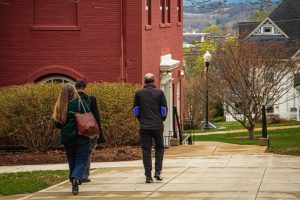Maintaining hope in a seemingly hopeless time
October 17, 2019
Our world would be nothing without hope. Sometimes I think that we forget the power behind such a small word. In this constant storm of negativity, it is only the hopeful who will change the world: who can see the world for what it is and want to change it, make it better.
Many of these people are young – Millennial or Generation Z. Most of us in college right now are Gen Z, and people younger than even us are attempting to change the world. Realistically, one might wonder if they should even bother. Isn’t it just hopeless anyway?
But we know better. I see it every day of my life
Students on this very campus hold the door for me every single day. I’ve never met them, nor do I have any idea who they are. Yet they do it anyway out of the kindness of their hearts. Someone else knocks all of their papers off their desk onto the floor. People around them jump to help clean it up.
On a larger scale, young people are attempting to change our world in drastic ways. The climate change activism is practically lead by a 16 year old, Greta Thunberg, who has somehow convinced us all to join in with her and others to do what we can to fix this issue.
Malala has made great strides in inspiring young people around the globe to support the education of young women in countries where access is limited. March For Our Lives is another huge movement led largely by high schoolers.
Clearly, we are not as complacent as everyone wants to believe we are. I’m tired of people constantly insisting that we are a bunch of “snowflakes” who freak out over everything. It’s just untrue. We speak out for what we believe in; we have hope that we can change the world.
Just because you don’t like what we have to say doesn’t mean you shouldn’t listen.
That’s not to say that we’re perfect, because we certainly aren’t. Some of us depend on our parents to help us do our taxes because our schools neglected to teach us how. Some of us burst into tears when faced with a rat in our house because we don’t know how to get it out.
One must wonder: if we can’t do these simple things, how can we possibly try to make the entire world a better place?
It’s quite simple: it wasn’t up to us what we learned in school. It wasn’t up to us what our parents taught us about “life.” We didn’t get to decide what we learned and when we learned it. A lot of us just had to work with whatever we were given.
And now that we’re getting older, we know that it’s time to make a change. We know that our voices are valuable.
Since we weren’t given a chance to learn these things or to grow up in a world where the older generations care about the environment or equal pay for all genders, for instance, we’re giving ourselves the opportunity.
What lies at the center of all of this is, of course, the most important thing of all: hope. I was reading Michelle Obama’s Becoming last month and there was a quote that Barack Obama sometimes used that he borrowed from a book he once read: “’Do we settle for the world as it is, or do we work for the world as it should be?’”
Young people embody this quote, no questions asked. We see what the world could and should be like, and we will settle for nothing less. We know that we have the capability to produce change, even if it’s only in small ways. Hope is the driving force behind our ideas.
It’s time to stop belittling young people for trying to change the world when we’ve barely been in it. Our voices are important and should never be silenced, whether we are trying to promote global change or just speak out about smaller concerns.
Kristin is a junior English major and is the Assistant Op/Ed Editor for The Voice.



















